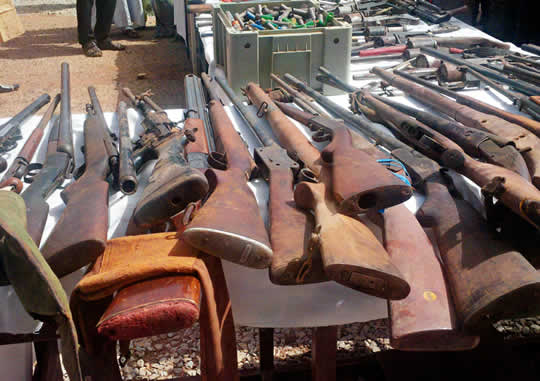Nigerian military has arrested over 40 individuals, including 18 soldiers, 15 police officers, and eight civilians, in connection with a suspected arms trafficking ring involving the illegal sale of weapons to armed groups, a military spokesperson confirmed Friday.
Captain Reuben Kovangiya, spokesperson for Nigeria’s joint anti-insurgency operation, described the arrests as part of a nationwide crackdown on arms racketeering within the country’s security forces.
“This is part of the counter-arms and ammunition racketeering operation conducted in every theatre of operations,” Captain Kovangiya told Reuters. “If any personnel engage in any act that is inimical to the system, they are arrested and tried.” While details remain limited, the operation reportedly uncovered a network of weapons diversion from military stockpiles, allegedly supplying arms to criminal groups, including Islamist insurgents.
Crackdown Amid Worsening Insecurity
The development comes at a time when Nigeria faces escalating security challenges on multiple fronts. In the northeast, the military is battling Boko Haram and Islamic State West Africa Province (ISWAP) militants, who have recently intensified their attacks and overrun several army bases in Borno State.
During many of these raids, insurgents have captured weapons and equipment, raising concerns about internal breaches and compromised security logistics.
In the northwest, armed kidnapping gangs—commonly referred to as “bandits”—have also grown in strength, relying on a steady supply of arms often traced back to military or police channels.
Ongoing Investigation and Prosecution Plans
Though Captain Kovangiya did not disclose the specific types or quantities of weapons involved, he emphasized that all suspects will face prosecution under military or civilian law.
Security analysts say the arrests signal an increased willingness by Nigeria’s military leadership to root out internal corruption and tighten control over arms stockpiles. However, they also warn that the breadth of the alleged involvement suggests deeper systemic vulnerabilities.
“The infiltration of rogue actors within security forces poses a grave threat to national security,” one Abuja-based analyst told New Daily Prime. “These arrests must lead to full accountability and structural reform.”
A Fragile Security Landscape
Nigeria, Africa’s most populous country and top oil producer, remains under immense security pressure, with armed conflict, banditry, and insurgency undermining public trust in state institutions. The military has pledged to restore discipline and tighten internal oversight.
The counter-arms operation is expected to expand in coming weeks as intelligence agencies continue their investigation into supply chains and internal collusion.
For now, the government is sending a clear message: there will be no tolerance for betrayal within the ranks.



